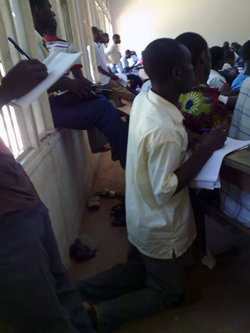Universities in Africa: the forgotten link?
The following post is by Moussa P. Blimpo, who just received his Ph.D. in Economics from NYU, and has recently returned from conducting fieldwork in Benin and The Gambia. He is from Togo. The working conditions are very poor in many African universities. I had a chance a few days ago to attend a class at The University of Lome, in Togo. My high school buddy, Zakari, is an assistant professor of mathematics there. With a meager salary, he has a daunting task to accomplish every semester. When he started teaching over a year ago, he was assigned to share an office with three tenured professors and another assistant professor. There is one computer and one printer to share, no copier, and no internet.
Zakari teaches four classes this term, with about 18 instructional hours per week. This year, he says, he has graded over 7000 exams already, and the academic year is yet to finish.
 I attended one of his classes. It was a lab session with third year biology students. I could count over 120 students in the classroom. As you can see from the picture here, some students in the back of the room were kneeling down to take notes and many others were standing. The room was fairly large, but there were not enough seats to accommodate all the students.
I attended one of his classes. It was a lab session with third year biology students. I could count over 120 students in the classroom. As you can see from the picture here, some students in the back of the room were kneeling down to take notes and many others were standing. The room was fairly large, but there were not enough seats to accommodate all the students.
I am not complaining for Zakari. Two of Zakari’s officemates left last year for Europe and they have no intention of returning.
My concern was for these students who are so eager to learn. As I stood there, I asked myself a few questions: Why is it that so little attention and funding is given to universities? With practical training, wouldn’t these young men and women be the one who will create jobs tomorrow? Shouldn’t African universities be strengthened to enable Africans to think about African problems?
Andrew Mwenda suggested, at the Best and Worst of Aid conference, that aid might be more effective if it is more often targeted to reinforce the strengths of a country rather than focusing on weaknesses all the time. He made a similar point here on TED.
I believe that universities may be one place where aid, coupled with a smart higher education reform, could be very productive.
 From Aid to Equality
From Aid to Equality
